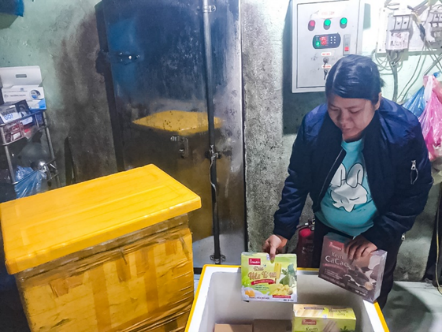
Back then, I had a cousin who worked in the garment factory and gave birth to a child. She got paid maternity leave. But for me, taking such a leave would mean my son would go hungry.
It’s 6:30 a.m. and 36-year-old Huong is hard at work in a -20° Celsius frozen storage room, arranging ice cream pints into foam boxes. Working with her husband in a small business to supply wholesale ice cream to retail stores across Thanh Hao city, Huong spends an average of two hours every day in the room under this extreme temperature. Just one month after giving birth to her first child in 2012, Huong was back to her daily routine in the frozen storage room, much to the concern of her mother. It’s a traditional Vietnamese belief that women should avoid exposure to the cold during the postpartum period.
“She told me to rest more. [If I didn’t take good postpartum care and keep working like this], my health would suffer later, when I am older,” Huong said.
While Huong knew that going to work would affect her health, she had no other choice. “Back then, I had a cousin who worked in the garment factory and gave birth to a child. She got paid maternity leave. But for me, taking such a leave would mean my son would go hungry.”
Health problems began in the year to follow for Huong. Sinus, allergies and a continuous runny nose, she said, were perhaps the result of the daily confinement in the cold. Worse still, she suffered a total of five miscarriages before giving birth to her second child after costly treatment.
Huong is just one example among the hundreds of thousands of Vietnamese women giving birth each year who are not entitled to cash maternity benefits to compensate for the loss of income due to taking a break after delivery. According to the international labour standards, women who are absent from work on maternity leave are entitled to a cash benefit that should be no less than two thirds of their previous earnings in a minimum period of 14 weeks to ensure an adequate rest and recovery time.
In Viet Nam, the maternity benefit is regulated in the Social Insurance Law and only applies to workers enrolled in the compulsory scheme. The benefit allows female workers to take six months of leave, with monthly cash benefits equivalent to 100 per cent of the average salary of the six months prior to maternity leave.
Although the maternity benefit in Viet Nam is considered to be one of the most generous in the region in terms of duration and benefit level, the majority of women workers in the country cannot access to it due to the limited coverage of the compulsory social insurance scheme. According to a 2019 International Labour Organization (ILO) report, only 30 per cent of women in the labour force were covered for maternity.1 Considering that not all women are in the labour force, the effectiveness and the level of protection are low.
The SP&PFM Viet Nam project is enabling the ILO and the Viet Nam Women’s Union, together with other stakeholders, to advocate for the adoption of a multitiered maternity benefit that would make maternity protection a right for all women in Viet Nam, regardless of their employment.
The ILO also estimated the cost of the maternity benefit for uninsured women at less than 0.04 per cent of Viet Nam’s GDP in 2020 and projected a decline to 0.02 per cent of GDP in 2030.2 In another study, the ILO estimated that the cost of providing a monthly allowance equal to a basic salary for six months to all uninsured women would be about 0.10 per cent of GDP over the long term, which represents less than 50 per cent of the cost of social insurance maternity benefits in the short term and less than 30 per cent in the long term.3 With such a maternity benefit system in place, mothers like Huong will be supported with more time to care for themselves and for their babies, employment stability and income security, all of which are important for their well-being, their socio-economic position and their labour trajectories.
Learn more about SP&PFM in Viet Nam here.
1 McClanahan, Shea, Bjorn Gelders and Betina Ramírez López, A Focus on Families: A Short-term Benefit Package for the Extension of Multi-tiered Social Security Coverage in Vietnam (2019).
2 McClanahan, Gelders and López (2019).
